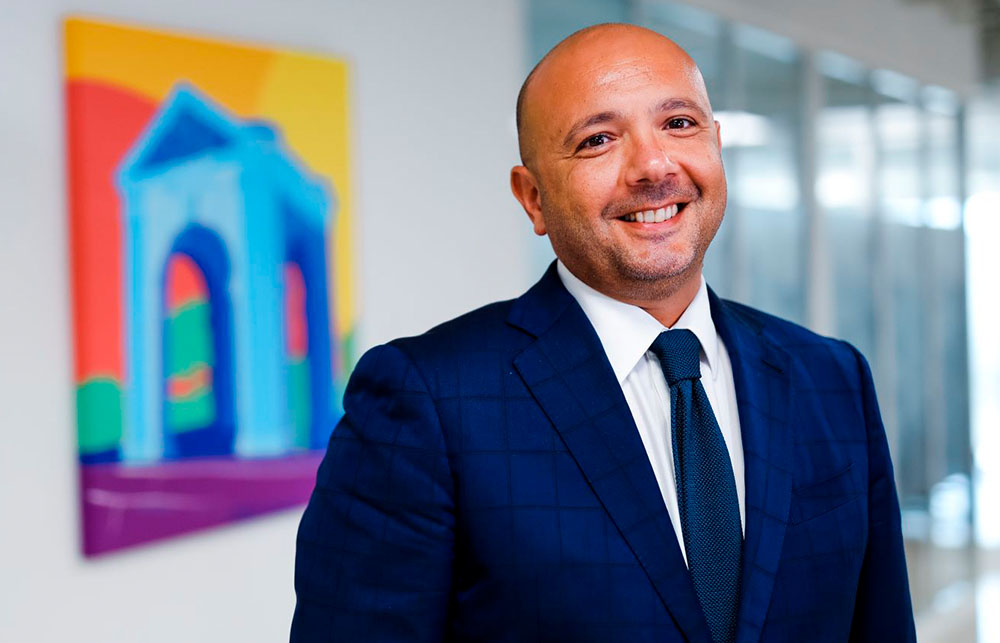
21 Mar Interview with Charles Mizzi, CEO, Residency Malta Agency
My first question is about Residency Malta Agency’s performance since the launch of the new program in 2020. Can you introduce the agency and elaborate on your primary source markets and main facts and figures in terms of generated applicant profiles?
Residency Malta is a government agency. Our primary aims are to administer the residency by investment programs. By programs I mean the old residency by investment program — the MRVP — and the newly launched MPRP starting from March last year. In June, we also introduced the Nomad Residence Permit. So now we are administering three programs.
Since 2016 we have attracted around 2800 applications in total. We approved 2269 main applicants, as well as 5303 additional dependents, because each main applicant has the possibility of including family members. Normally, a typical application would be composed of a family unit: the husband, the wife and their children. Parents and in-laws can also be added to the application. It’s a family-oriented program. In fact, one of the features of the program also allows the family to include further dependents as they go along: if they have more children, they can be included in the same residence permit. If the children eventually grow up and get married, they can also include the future husbands and wives in the same application. That is one of the strong points of this program: a family-oriented program which allows applicants to give better opportunities to their families.
When it comes to the application processing, we have approved 2269 applications. We have a rejection rate of around 10 percent. We give a lot of importance to the due diligence process and each application goes through rigorous checks to make sure only fit-and-proper applicants make it to Malta.
The Nomad Residence Permit obviously targets a different audience. Here we’re talking about remote workers, digital nomads, people who would want to explore new countries, people who have more flexibility in their lives. Applicants need to be third-country nationals, be employed with a company registered outside Malta or be self-employed. They can also be freelancers or consultants working for companies outside Malta.
So far, we are doing very well, and application numbers are increasing month-on-month. Strategically, from day one, our goal was to attract quality rather than quantity. We set a threshold of a minimum $3000 earnings a month. This enabled us to attract very high-quality applicants. Just to give some statistics, the average income of tour applicants is $64,000 per annum. Most of the applicants hold a degree, Masters or PhD and are employed in IT or marketing. Applicants come from all over the world but the majority hail from the US and the UK. The average age is 37.
You were appointed CEO on February 1st, 2019, and this month marks your three-year anniversary in the role. The program received the peak applications in 2020, around 988 applications. Compared to the previous years, what did you do to increase the program’s competitiveness in relation to other markets and to what do you owe this increase of the applications?
We owe this to the change in the modus operandi of the agency. The first thing I did when I joined, at the time the Malta Residency Visa Agency, was conduct an operational review of the organization. At that point in time, we had a substantial backlog of applications. We invested substantially in IT, in people and training, and the agency underwent a reorganization. These efforts enabled us to make huge progress. Today we no longer have a backlog, and our licensed agents tell us we have become one of the most efficient agencies in the industry. We are promising a four to six month delivery time, and actually we are doing even better than that.
At the same time, we didn’t compromise on the due diligence process. We retained the same standards and the same process. We just became more efficient. And we will continue to invest further. In fact, this year the aim is to start accepting part of the application process online. We will even be launching a digiboard for our agents so that they can have access to their applications, check their status and have a quicker interaction with us.
Bottom line, we believe we now offer a program that gives more value for money, at a very competitive price point. These are the main attributes which enabled us to position ourselves among the best programs in the residency-by-investment industry.
Speaking about the technology, obviously Covid-19 pandemic posed serious challenges to various businesses and governments around the world. But it also gave the organizations an opportunity to rethink their strategies and implement digital solutions to increase the efficiency in their operations. To what extent did the pandemic affect Residency Malta Agency’s digitalization strategy? You mentioned the online solutions you adopted that took effect on your daily operations.
Covid-19 had a big impact. Agencies in some countries even closed down during the pandemic. We didn’t. We remained open for business and still accepted applications. Obviously, we adopted measures to mitigate the risks, but we remained operative. That helped us also to be able to tackle the operational issues that we had at that time.
During this time, we also rebranded the agency from MRVA to Residency Malta. This is not a cosmetic change. It is a reflection of the change in operational culture, of a fresh work ethic and of where we want to position ourselves in the market. All this was done during the pandemic.
Obviously, Covid impacted us in other areas. We couldn’t travel to participate in roadshows, and we had to shelf our annual travel plan that would have seen us reach out to our target audiences. We increased our virtual presence via webinars and spoke to prospective applicants and agents in the digital space. However, we feel it’s not the same as going out there and talking to people face to face. Hopefully, things will now improve. We have already been to Dubai twice over since November, speaking to agents, introducers and clients. We participated in an industry conference and visited the Expo. It’s good to once again be able to directly showcase Malta and our program
And we’ve now seen a turn for the better. We’re receiving more applications, and agents are becoming busier. So, we are hopeful that this year will be a very good one.
According to a recent report from Investment Migration Insider (IMI) Daily, 87% of your clients are from China. Do you have a strategy to diversify your source markets? What is your strategic vision to attract a diversified applicant pool and how important is the Middle East and the Gulf region for you?
This is true. China and Southeast Asia have been the main markets for us over the last year. It’s mostly the same trend everywhere: China is very strong in investment migration. However, we are working to attract people from different regions. This year we plan to rollout a roadshow program that targets other countries. This will complement our advertising, which aims to reach diverse markets. We’re investing a lot in marketing and our collateral is being translated to different languages because our ultimate aim is to attract as wide an audience as possible. Again, the limiting factor at this point in time is Covid. If things improve, reaching out to different regions would be easier.
You mentioned earlier the digital nomad concept. Could you elaborate a little bit more about the Nomad Residence Permit that was launched in summer of 2021, just six months ago. What is unique about this program and how a typical digital nomad can take advantage of this opportunity?
Competition is fierce and more and more European countries are launching their own program. It gives us more challenges, but we believe that we have a very good offering.
Our program differs from others primarily because it grants a residence permit and not a visa. We understand that digital nomads like to travel — they want to spend two months in our country and then visit someplace else, then come back and then go on to explore a new country. And our residence permit gives them the freedom to do just that. Our permit is valid for one year, giving holders access to Schengen countries. They can come to Malta, stay here for 4 months, and then decide to go to Italy for 1 month and then come back again and go somewhere else. Our program gives them that flexibility. The permit is renewable for a further period of one year, up to three years. This is also another differentiating factor from other countries.
The application process is straightforward and can be done online. Applicants need not come to Malta first to be able to apply. They only come to Malta once the approval is granted. It’s a fast process and we promise a reply with in 30 days. Here again, we are being very efficient.
Then obviously there are Malta’s attractions. In Malta, the population is fluent in English, so communication is very easy. People can go around the country easily, and they know that they can communicate with the Maltese. The country enjoys nationwide 5G and hundreds of free public wifi hotspots, so they can just take their laptop, go to the beach, and work from a place in the sun. They need not be confined to their rented apartment. These are very strong points that help attract remote workers to Malta.
This is also the feedback we receive from the digital nomad community already in Malta. Because, obviously, this is not a completely new concept. We’ve had digital nomads from the EU for years. These individuals do not require permits because they enjoy freedom of movement. What we did was extend it and make it easier for third-country nationals to come to Malta as well. There are even nomads who, after staying in Malta for some months, fall in love with the country and decide to relocate for a longer period and open their own business, perhaps even offering their services to Maltese companies. They start out as nomads but eventually change their status to a more permanent one. So the Nomad Residence Permit offers a lot of opportunities to both the country and to nomads.
You answered my next question but maybe you would like to elaborate more. What makes Malta unique? What are the key selling points compared to the other jurisdictions when it comes to the citizenship by investment programs or its digital nomad programs?
Malta is a politically stable country and one of the safest countries in the world. We enjoy a mild climate and 300 days of sunshine. We have fantastic beaches. We boast excellent healthcare services. Those who come with their children know we offer a high standard of education. The IT infrastructure is robust. The country is very well connected via air and sea links. In 3 hours, you can be in London and in one-and-a-half hours in Rome.
Then there’s the English language. I have heard instances of second residents in some countries not being able to get medical assistance because they couldn’t communicate This would be very worrying. In Malta it’s a totally different story.
Are there any questions or issues that you wanted to address additionally? Are there more topics that are relevant to communicate?
Maybe what I didn’t mention was the unique selling points of the Malta Permanent Residence program: the fact that our program offers permanent residency from day one as well as the option to lease property. We are one of the few, if not the only country, to offer these features. And it’s a family-oriented program that includes up to four generations in one application.


Sorry, the comment form is closed at this time.